Time Tracking Best Practices for Jira
Have you ever wondered how successful teams keep their projects on track and under budget? Well, one of the secrets lies in efficient time tracking, and if you’re using Jira, you’re in luck. Time tracking is a critical component of project management. It helps teams understand how much time is spent on specific tasks, aiding in resource allocation and project planning. Jira, a popular project management tool, offers robust time-tracking features that cater to the needs of diverse teams.
Understanding Jira Time Tracking Capabilities
At its core, Jira time tracking revolves around meticulously recording the time spent on various tasks and projects. This feature is pivotal for gaining insights into work distribution, resource management, and ensuring that projects adhere to their timelines.
With the help of Jira, users can log hours against specific issues or tasks, offering a clear picture of where time is being invested. Time tracking is critical for various stakeholders: from project managers to team members, and clients, as it provides critical data that aids decision-making and project evaluation.
Jira offers several metrics to help you track time effectively:
- Time Estimates: Set accurate estimates for tasks to help plan your project timeline. Team members can estimate required time, allowing for comparisons between estimated and actual time spent, enhancing future project planning.
- Work Log Tracking: Users can manually enter time spent on tasks or utilize automated timers, providing flexibility and accuracy in logging work hours. Team members can log work on each issue, providing real-time tracking.
- Time Tracking Reports: Analyze these reports to understand where time is spent and how to improve efficiency. Customizable reports offer insights into time allocation, facilitating detailed analysis of project and team performance.
When users enable time tracking in Jira, the time tracking fields appear in projects and issues. Jira offers various project templates so it doesn’t matter what type of team you manage – business, creative, or software development – you will find the needed template.
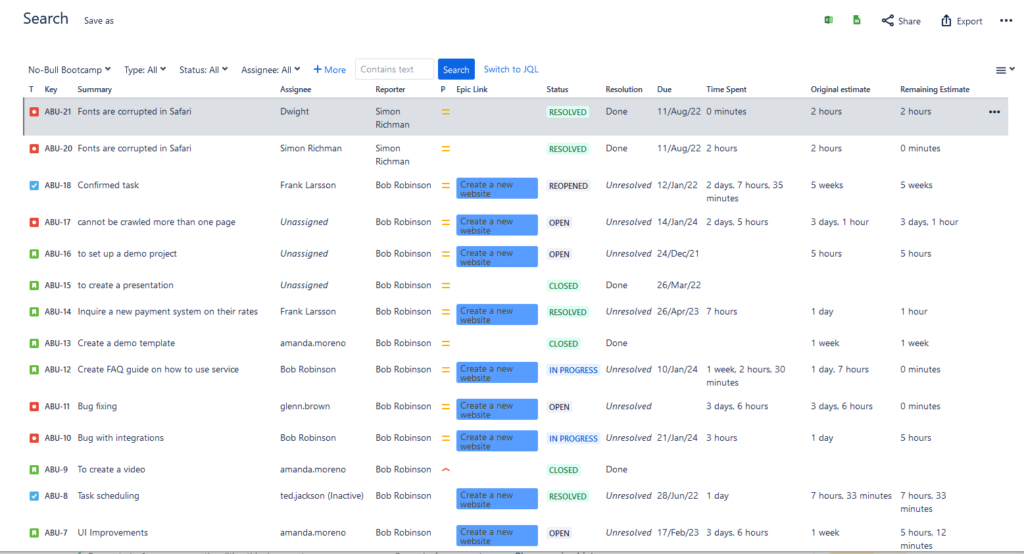
Jira is a perfect tool for teams of different types and sizes. Many Agile Teams use Jira for project management, as it allows them to stick to agile principles with the help of Scrum and Kanban boards, and manage issues of various types: bugs, tasks, epics, and user stories. Also, Jira allows to set estimates in hours as well as in story points.
Project boards show project issues with details, including time-tracking fields. Here we can set start and due dates, observe an estimate in hours and story points, issue priority, etc.
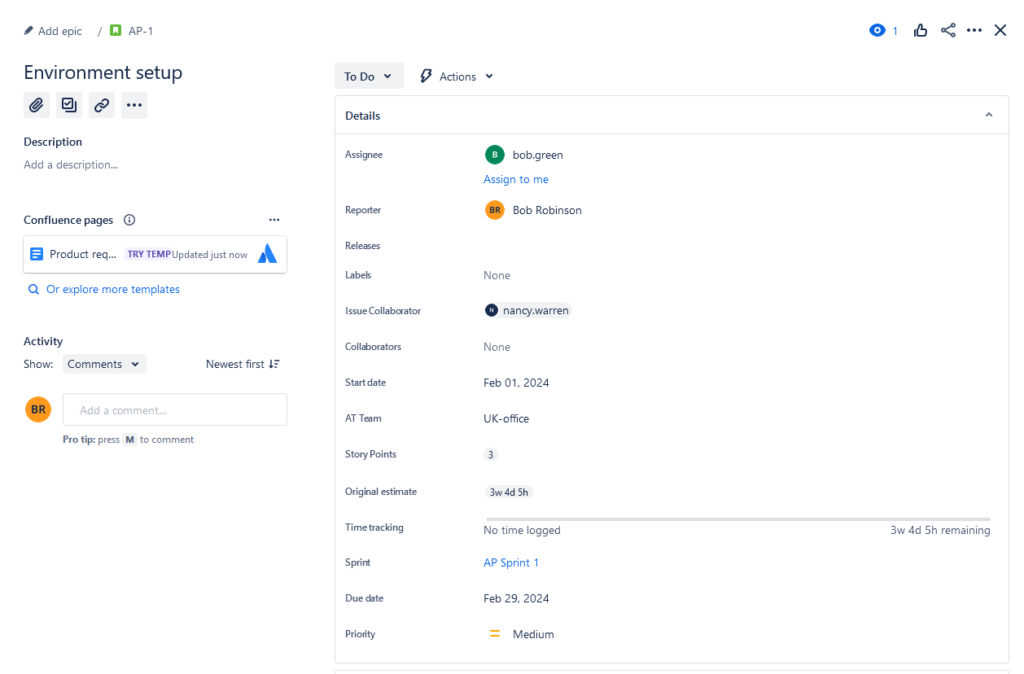
Users can log worked hours directly from the issue card, this process is simple:
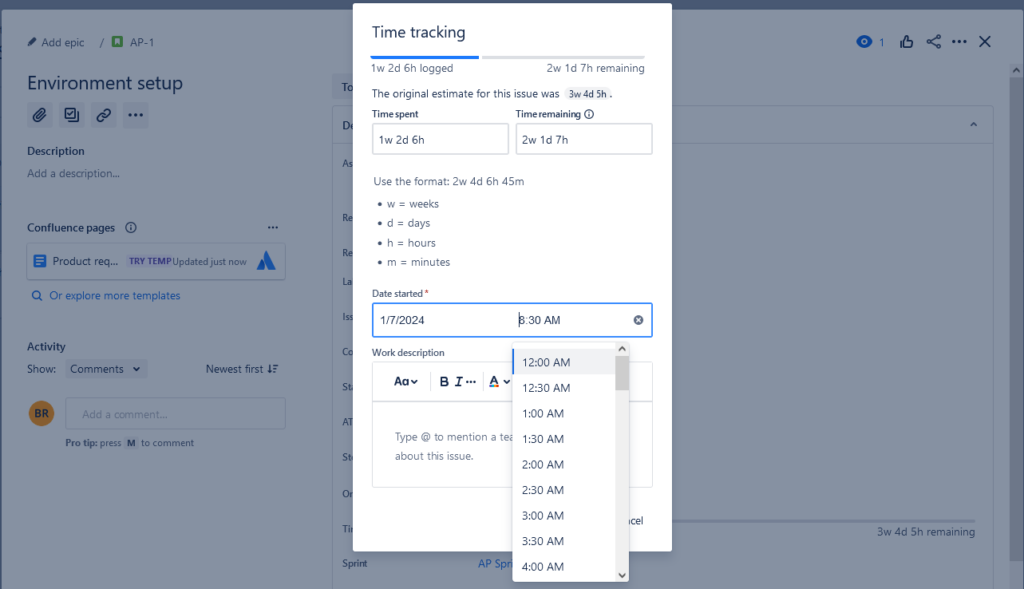
When the user logs work the time tracking data is updated, including the remaining estimate. This data can be used in time tracking reports thereafter.
Jira Time Tracking Report
Users can find numerous project, issue, and time-tracking reports in Jira. Time tracking reports in Jira are designed to provide a detailed overview of the time spent on projects and tasks. These reports serve as a crucial tool for project managers, team members, and stakeholders to analyze work patterns, assess productivity, and ensure efficient project management.
Time tracking reports offer a clear picture of how team members allocate their time, revealing patterns and deviations from planned schedules. By analyzing these reports, managers can optimize resource allocation, ensuring that time is utilized efficiently and effectively.
Here we can see the example of a Jira time tracking report for a single project providing us with the data on project progress and accuracy, and a detailed picture of task estimates and time spent:
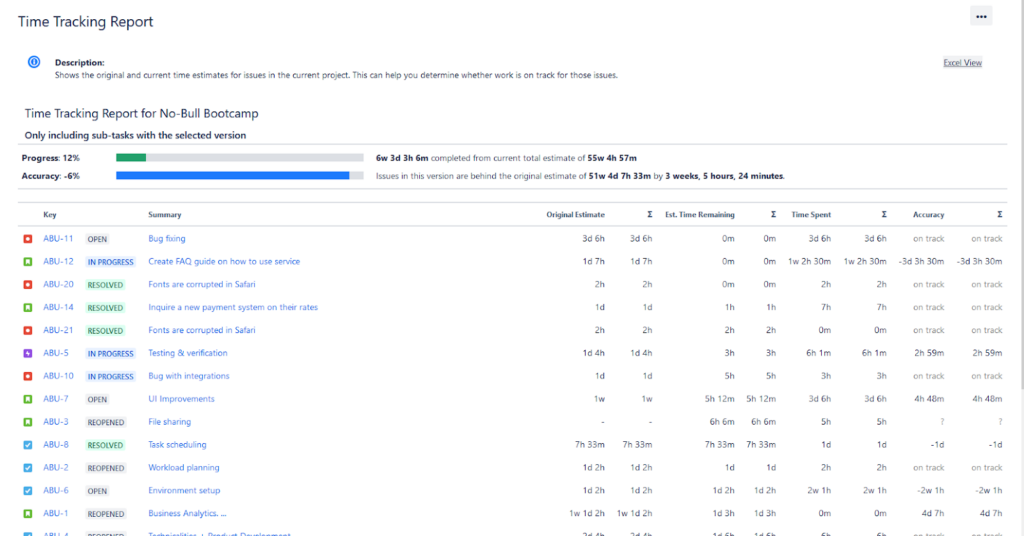
As we can see, this report focuses mainly on the issue estimates and progress without mentioning particular teams’ and users’ efforts. We need to mention that Jira doesn’t provide in-built user and team timesheets, but it gives an opportunity to integrate with third-party add-ons and Jira plugins to advance the time tracking capabilities and supplement missing features.
Benefits of Jira Time Tracking
Understanding the benefits of Jira time tracking can significantly enhance project execution and management. Here’s an exploration of the advantages it offers.
Improved Project Time Management
Jira’s time tracking feature allows teams to log work hours directly on tasks and issues. This leads to a more accurate understanding of how much time individual components of a project are consuming. Such precision in tracking time helps in better estimating future projects and managing ongoing ones more effectively.
Enhanced Accountability and Transparency
With time logged against specific tasks, Jira time tracking fosters a culture of accountability and transparency within teams. Team members are more mindful of their work hours, and project managers gain a clear view of the time being spent, reducing the chances of time-related disputes or misunderstandings.
Data-Driven Decision Making
Jira’s reporting tools use time-tracking data to generate insights into project performance. Managers can identify trends, such as tasks that consistently take longer than estimated, enabling informed decision-making and strategic adjustments to project plans.
Streamlined Invoicing and Billing
For organizations that bill clients based on time spent, Jira’s time tracking simplifies the invoicing process. The ability to export time logs facilitates accurate and transparent billing and customer invoices ensuring that clients are charged fairly for the work done.
Boosting Productivity and Efficiency
By analyzing time-tracking data, teams can identify bottlenecks and unproductive patterns. This awareness leads to more focused work methodologies, ultimately boosting overall productivity and efficiency.
Better Resource Allocation
Understanding how time is spent on various tasks enables project managers to allocate resources more effectively. Time tracking data in Jira helps in identifying tasks that require more manpower or specialist skills, leading to smarter resource allocation.
Integrating with Other Tools
Jira’s ability to integrate with various time-tracking apps enhances its functionality. This interoperability allows for a more tailored approach to time tracking, catering to diverse team needs and preferences.
Best Practices for Jira Time Tracking
To get the most out of time tracking in Jira, check out the following practices:
- Set Realistic Time Estimates: Ensure that time estimates are achievable and consider previous project data for accuracy.
- Regularly Log Work: Encourage your team to log time regularly for accurate tracking.
- Review and Adjust: Regularly review time-tracking data to identify trends and make necessary adjustments in project management and team workflows. Use time-tracking data to make informed decisions about project adjustments and future planning.
- Leverage Integrations: Utilize integrations with other tools to streamline the time-tracking process and reduce manual effort.
Time Tracking for Teams with Clockify
Jira is not the only popular platform for time tracking, companies sometimes combine Jira project management with the time tracking features of standalone apps like Clockify.
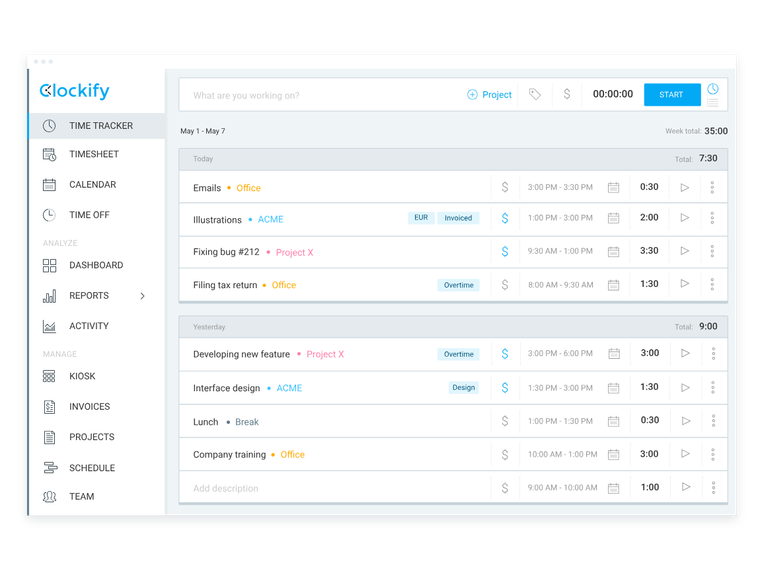
Source: Clockify Features
This solution is straightforward and helps numerous teams across the world efficiently track work hours. Clockify offers timesheets based on the logged time of employees, the timer, that helps accurately calculate working hours, and a comfortable calendar view. The app also provides the possibility to track billable hours for accurate client billing.
Among other notable features are reports, holiday management features, auto tracker, and project budget estimation.
Teams can log time from everywhere as Clockify provides a Web app and a Desktop app for Windows, Linux, and Mac for the user’s convenience. The mobile solution is also available for iOS and Android.
Jira Time Tracking Plugins
Jira time-tracking apps extend the basic functionality of Jira’s native time-tracking. They are designed to cater to specific needs, offering enhanced features, improved user interfaces, and additional reporting capabilities.
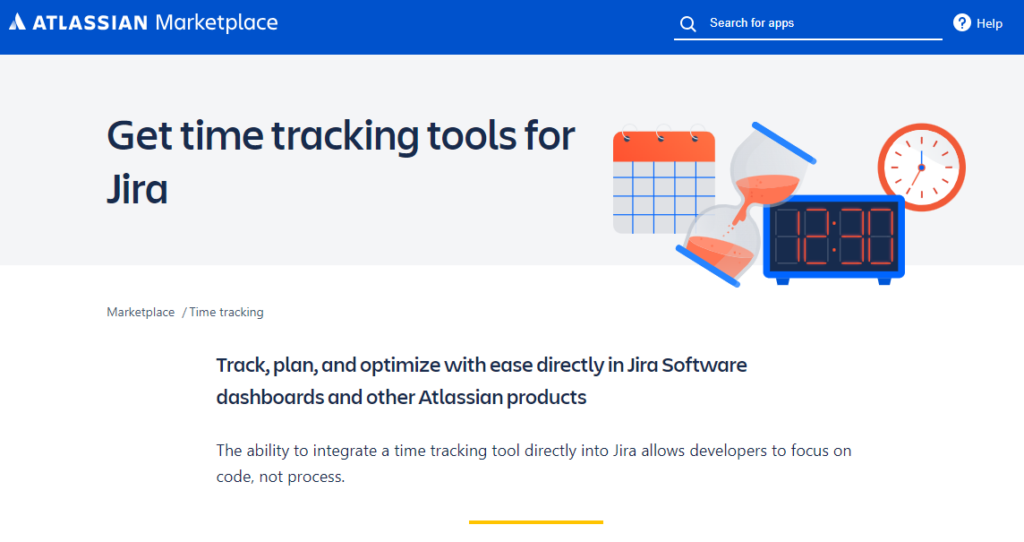
The Atlassian Marketplace boasts a plethora of time-tracking plugins, each offering unique functionalities tailored to different project management needs.
To get advanced time-tracking functionality, Jira users can try plugins, such as ActivityTimeline. Let’s take a quick overview.
ActivityTimeline – Resource Planning and Time Tracking for Jira
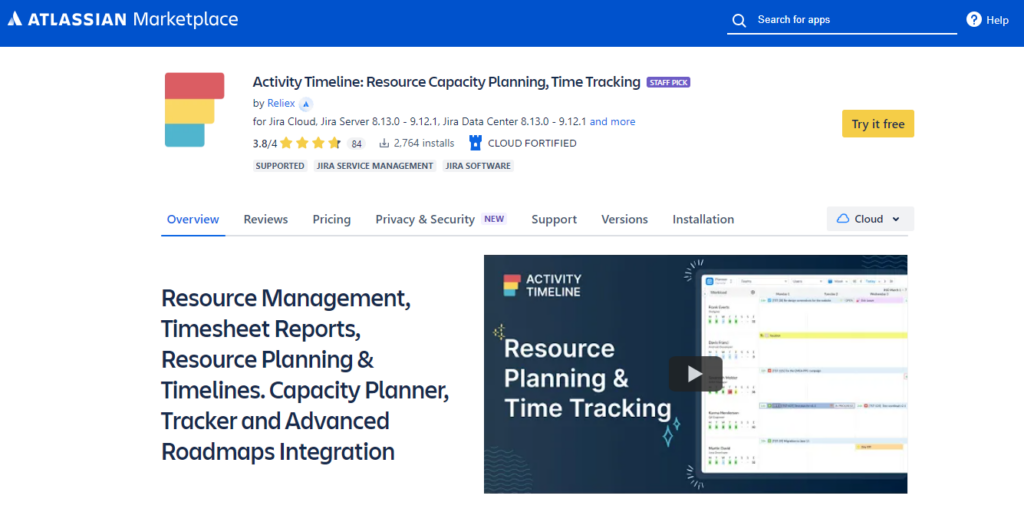
ActivityTimeline for Jira is a comprehensive tool that provides time-tracking and team-monitoring facilities. This app helps to manage projects and tasks, organize teams, and track user time with customizable timesheets and reports in a single place.
Users have a personal workspace where they can log their worked hours, leave comments, plan work, and track time with the help of the built-in Timer.
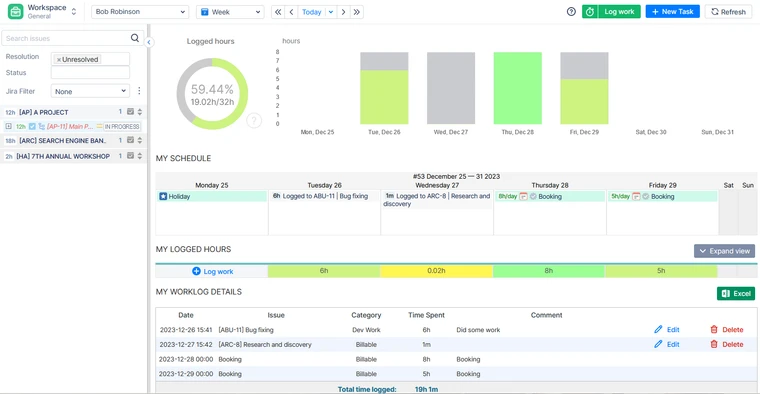
Holiday management features are also included, so employees can request and schedule days off, sick leaves, and other events.
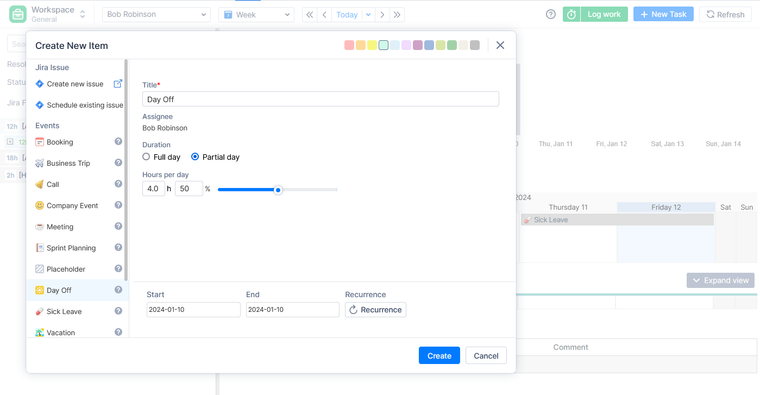
The non-working days will be automatically counted in timesheets and reports for accurate effort estimation and project billing.
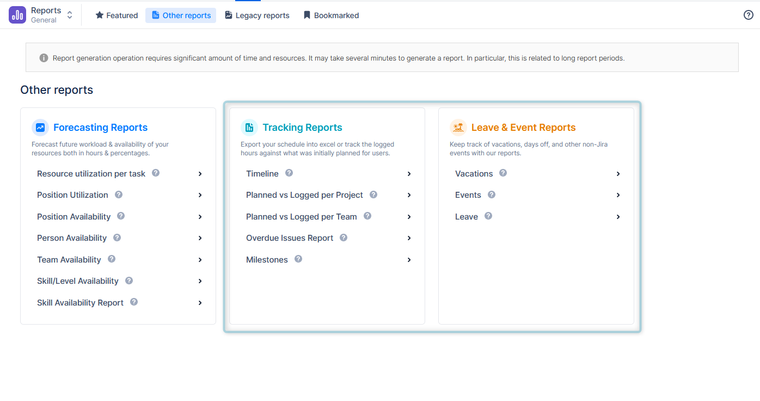
Here you may find various customizable user, project, and epic timesheets:
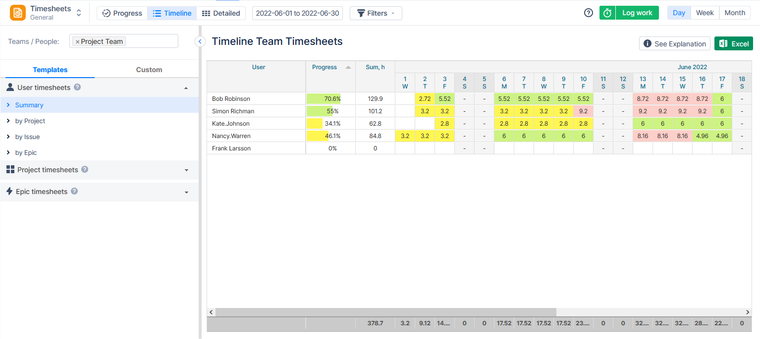
Get detailed timesheets, include Jira filters, and track billable and non-billable hours:
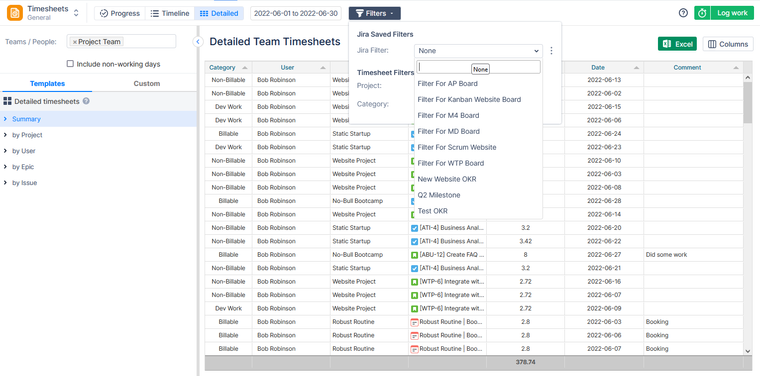
Export timesheets like Excel file. All the data is fully synchronized with Jira and vice versa. The app is available for Jira Cloud/ Data Center and compatible with Jira Software and Jira Service Management.
Final Thoughts
Time tracking in Jira is very important for teams and any project manager looking to streamline their processes and enhance productivity. By understanding its features, integrating best practices, and using the right tools, you can transform the way your team manages time, leading to more successful project outcomes.
Time tracking tools are a valuable addition to Jira, offering enhanced functionalities and a more tailored experience. By carefully selecting and integrating plugins, teams can significantly improve their time-tracking efficiency, gain deeper insights into their projects, and enhance overall project management effectiveness.







